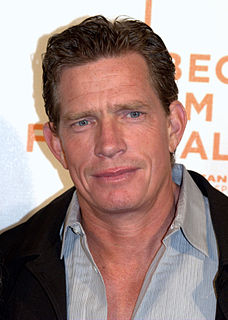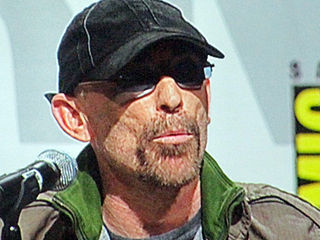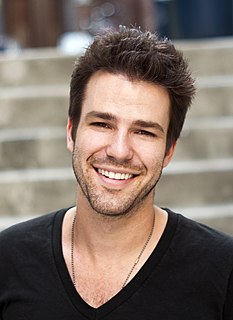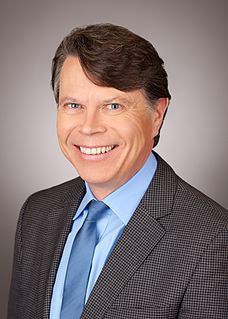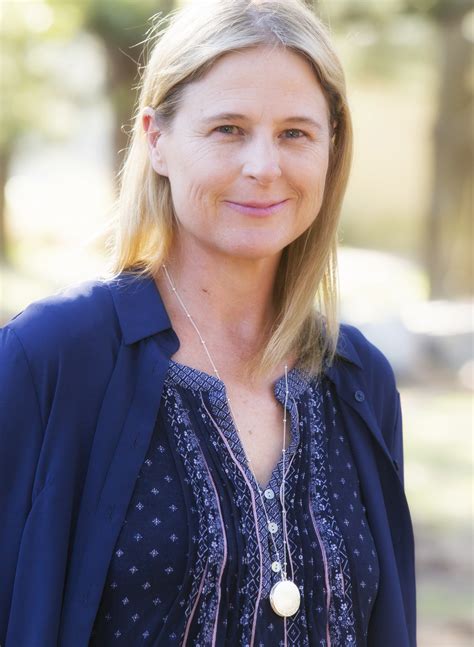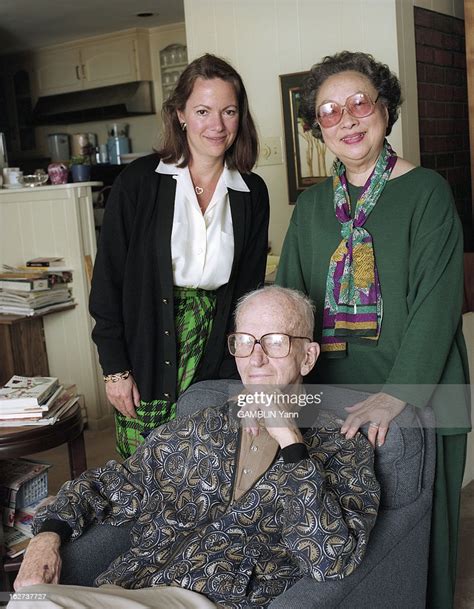Top 1180 Specifically Quotes & Sayings - Page 20
Explore popular Specifically quotes.
Last updated on April 18, 2025.
I used to hate the urban environment and the urban din. But I realize now that it's really not that much different than living next to a waterfall for wildlife. Most wildlife - unless they're specifically adapted - avoid being around a waterfall or whitewater streams and rivers because it jams their sense of surveillance. They are more vulnerable, and their message loses intelligibility. Now, the ouzel is able to overcome that in various ways. Back to the urban environment, we're talking and delivering messages as if we weren't next to a waterfall, and that's a problem.
I would go into my three different sisters' rooms in the early-mid '70s and they had very specific different tastes in music. I specifically remember lying on my different sisters' bedroom floors and listening to their record collections. And "Starship Trooper" was one of my sister Nancy's favorite songs and favorite album. Music is so defining for me. In the late '70s and early '80s, I worked in radio. When I was in high school, I worked at two different radio stations.
The reason why it is so difficult for existing firms to capitalize on disruptive innovations is that their processes and their business model that make them good at the existing business actually make them bad at competing for the disruption. Companies in fact are specifically organized to under-invest in disruptive innovations! This is one reason why we often suggest that companies set up separate teams or groups to commercialize disruptive innovations. When disruptive innovations have to fight with other innovations for resources, they tend to lose out.
Interesting thing that is happening in American society is that people are starting to talk about money. I don't know how you feel about this, but for a long time, nobody was talking about money. It was a secret. And it's kind of very interesting because we do lots of stuff to portray to people about how much money we have, the clothes we wear and the cars we have and the house - they all kind of depict to other people, signal how much money we make, but we don't talk about it specifically.
There's a feminist critique of Muslim Arbitration Tribunals, which I'm certainly not unsympathetic to, because as I keep saying, I come from a human rights context. But there's a feminist critique of Muslim Arbitration Tribunals specifically, which says women are going to have their rights eroded by virtue of the fact of these courts are going to negotiate settlements and negotiate the dropping of criminal charges against men. There's not been any evidence of that taking place.
There is a certain amount of righteous indignation I hold for the American culture, because to get back to the real root of it, to get broader about it, my opinion that is my species - and my culture in America specifically - have let me down and betrayed me. I think this species had great, great promise, with this great upper brain that we have, and I think we squandered it on God and Mammon. And I think this culture of ours has such promise, with the promise of real, true freedom, and then everyone has been shackled by ownership and possessions and acquisition and status and power.
The less control people had over their work, the higher their blood pressure during work hours. Moreover, blood pressure at home was unrelated to the level of job control, indicating that the spike during work hours was specifically caused by lack of choice on the job. People with little control over their work also experienced more back pain, missed more days of work due to illness in general, and had higher rates of mental illness-the human equivalent of stereotypies, resulting in the decreased quality of life common to animals reared in captivity.
As Dutch, British and French explorers literally put this Great Southern Land on the map it would be ridiculous to say that modern day Australia is anything other than a grand - and successful - outpost of
Euro-colonialism and, more specifically Anglo-Celt British colonialism. It's a fact of life like the Euro-colonization of the Americas etc. If it was an outpost of, let's say, Iranian or Zimbabwean colonialism would so many people still be so desperately trying to get into Australia by any means necessary, legal or otherwise? It's doubtful. Thank the Gods for Euro-colonialism!
Theoretically, you can make, obviously, a powerful argument that centuries of slavery, Jim Crow, discrimination are the primary cause for all those gaps. That those were wrongs done to the black community as a whole, and black families specifically, and that in order to close that gap, a society has a moral obligation to make a large, aggressive investment, even if it's not in the form of individual reparations checks, but in the form of a Marshall Plan, in order to close those gaps. It is easy to make that theoretical argument.
I don't know what I could say specifically, except that everything I've learned as a kid of course must somehow play into what I do now. I think when everything kind of drifted away, I had to go out into the world and learn how to emotionally be okay with all that, which to me was a decades-long process. But also I happened to find my way in life, to find a living, to figure out what I wanted to be when I grow up. I think all of that now probably helps me. It probably gives me more life experience to draw from.
I was kind of in an experimental phase with The Disposable Rappers. This is boring to me, because it's true, but when I was a sophomore in high school, I visited my sister in college and saw an improv troupe, and that was a genuine moment for me. It was an actual "Aha!" moment. After I saw that, I said, "I want to do comedy." So The Disposable Rappers started doing improv in addition to rapping, and when I went to college, I very specifically went saying "I want to join a comedy group."
I'm a touring artist - I love going out and playing live, and I was sick of making records didn't translate well live - that misrepresented who I was as an artist. I'm not saying those records weren't good. I think they're great. I think a lot of them have great songs. My challenge was making the songs that were specifically great for the type of personality I wanted to present which was my personality - I wanted to get that across on record - and have something that was fun and energetic live.
There's a huge challenge around coral bleaching specifically, because when most people think about coral, they think about the beautiful, white sculpture sitting on their mantle. And it looks so pristine and clean and beautiful. It's not supposed to look like that when it's in the ocean. It has color, it has animal flesh living on it, it has plants living inside of that. They look very, very different when they're healthy in the ocean than they do when they're sitting in somebody's home.
Our whole culture is based on the appetite for buying, on the idea of a mutually favorable exchange. .... For the man an attractive girl - and for the woman an attractive man - are the prizes they are after. 'attractive' usually means a nice package of qualities which are popular and sought after on the personality market. What specifically makes a person attractive depends on the fashion of the time, physically as well as mentally. ... Two persons thus fall in love when they feel they have found the best object available on the market, considering the limitations of their own exchange values.
The foreign audiences are somewhat surprised and happy to find an American film that asks questions about American culture. There's a certain kind of cultural imperialism that we practice. Our films penetrate every market in the world. I have seen and have had people reflect to me, maybe not in so many words or specifically, but I get the subtext of it - they're somewhat charmed and surprised and happy to see an American film reflect on our culture. Because they see other cultures reflect on our culture but they don't see US culture reflecting on itself in quite the same way.
Sam Fuller and 'Shock Corridor' can only be conjured as a mantra. 'Shock Corridor' is a classic work of art - it's unique. It comes from the unique experience of being Sam Fuller and yes, there's always that element of 'Shock Corridor' hovering around the picture, but never specifically. In fact, I didn't even screen it because it's in us. It's in me anyway. It's in me. It was a way of conjuring up support just by saying the name, 'Shock Corridor,' as I was going to shoot. Poor Sam [Fuller]...
So confident am I that the number of deaths from violent storms will continue to decline that I challenge Mr. McKibben - or Al Gore, Paul Krugman, or any other climate-change doomsayer - to put his wealth where his words are. I'll bet $10,000 that the average annual number of Americans killed by tornadoes, floods and hurricanes will fall over the next 20 years. Specifically, I'll bet that the average annual number of Americans killed by these violent weather events from 2011 through 2030 will be lower than it was from 1991 through 2010.
Sixty-five days principle photography, five-day weeks, which is the only way I'll work. With my cinematographer Russell Boyd, we take as much time as possible before pre-production, looking at stills. The next most important thing: he will come to me and talk about lenses. And I'll see his plan, which is generally great, and I might talk about how the light will be, handheld or not? I talk very freely, and try not to talk specifically, just talk around it, because it can unlock all sorts of things.
The importance of the term "genocide" for many Indigenous Peoples is that it is more than a term or an accusation; it is a word created in the wake of the Shoah in Europe to describe what happens when a people are targeted by a government for extermination, as were the Jews of Europe, and which is the term used in the most important international law related to concerned Indigenous Peoples, as the only international human rights law that pertains specifically to collectivities of people rather than individuals.
I admire Joyce Maynard a lot, specifically her memoir "At Home in the World." Her writing is beautiful and fascinating and seemed to give me validation to the idea that I could write validly in earnest about my life with (my) very feminine point of view, and also that I could unapologetically explore the bad traits of my character (which I find to be more interesting to explore than the good traits), as well as explore other concepts that interest me like private vs public personas, age gap relationships, etc.
When I'm writing a play I hear it like music. I use the same indications that a composer does for duration. There's a difference, I tell my students, between a semi-colon and a period. A difference in duration. And we have all these wonderful things, we use commas and underlining and all the wonderful punctuation things we can use in the same way a composer uses them in music. And we can indicate, as specifically as a composer, the way we want our piece to sound.
My literary criticism has become less specifically academic. I was really writing literary history in The New Poetic, but my general practice of writing literary criticism is pretty much what it always has been. And there has always been a strong connection between being a writer - I feel as though I know what it feels like inside and I can say I've experienced similar problems and solutions from the inside. And I think that's a great advantage as a critic, because you know what the writer is feeling.
I was really inspired by my own experience, and specifically my own identity crisis but larger than that, I also wanted to explore the trend of reverse immigration, of the immigrant returning home after being in a host country or an adopted home for 20 years, and finding themselves at various levels of discord with the home culture. I wanted to explore people building lives across multiple geographies. I think that's, something that we're experiencing more and more as travel becomes easier, as people are traveling more for work. People can work from anywhere.
Most people will agree that they would like if they were treated by other people based on what they have concretely done in their life, not what other people have done, with their lives. Focusing on being a person instead of an Asian or an anything seems to promote a worldview that encourages people to treat others based on what each person has specifically done in their life, which seems like it would reduce such things as war, racism, unfairness, "hate crimes".
The thing of being able to share somebody's reality, which has so far been a matter of what communication is about, you know. Now it has gotten a whole new leg. It has gotten a thing of being able to actually step in somebody's reality and walk through it like they do, experience it the way they do, specifically. The implications, to me, are immense. I mean, how far can it go? If you go into a complete, like a cyberspace model of some type, in which... you know the discussion about the mind and the interaction between the mind and the universe as a holographic phenomenon.
I have spent much time in the study of the abstract sciences; but the paucity of persons with whom you can communicate on such subjects disgusted me with them. When I began to study man, I saw that these abstract sciences are not suited to him, and that in diving into them, I wandered farther from my real object than those who knew them not, and I forgave them for not having attended to these things. I expected then, however, that I should find some companions in the study of man, since it was so specifically a duty. I was in error. There are fewer students of man than of geometry.
What has happened to protesters in the past was that, basically, the government in 2012 put an end to a series of mass protests by changing laws, by making it possible to arrest anybody for protests, and by making basically a show of imprisoning not just protest leaders, and not specifically protest leaders, but activists, rank-and-file protest participants. That gets across the idea that anybody who joins a protest without being an organizer, without being a visible leader, risks arrest, and not risks just arrest, but years in a Russian jail.
When I hear that Jennifer Lopez is such a role model for Latinas, on the one hand I respect her for her business sense and I respect her for her ambition. But she's in the entertainment world. She's done it on her looks and very specifically on her anatomy. Madonna is also considered a great businesswoman and so is Yoko Ono. I feel if I had a young daughter right now, I would feel a little discouraged if that was my daughter's primary role model for success and for young people, for Latinas and Latinos.
That’s what i love about poetry. The more abstract, the better. The stuff were your not sure what the poets talking about. You may have an idea, but you cant be sure. Not a hundred percent. Each word, specifically chosen, could have a million different meanings. Is it a stand-in ?a symbol for another idea? Does it fit into a larger, more hidden, metaphor? ...I hated poetry until someone showed me how to appreciate it. He told me to see poetry as a puzzle. Its up to the reader to decipher the code, or the words, based on everything they know about life and emotions.
How many of you heard the voice of God speak specifically, clearly, directly, and personally, to you? Can you just put a hand up? I'd like you to share it. Can you put a hand up for a minute? Just want you to look around; that's people saying, "God Almighty, the Maker of heaven, the one Who's sitting on the only throne that's not under threat - He spoke to me. He spoke to me." "God spoke to me." Don't let the voice of the darkness tell you that you are not worth that God would not speak to you. Don't let him tell you, you don't matter. God spoke to you.
We're dealing with music that is being played by traditional instruments in a specifically built building called a concert hall.
But classical is not - the reference is wrong, because classical on one hand refers to one period in musical history, which is Mozart, Hayden, Beethoven, which is a fine period in musical history, but it was a while ago.On the other hand, it sort of alludes to some kind of "class," which A, is not true; B, is kind of detrimental to the whole idea. Because the point is that this music is available and it's actually relatively reasonably priced.
Peace happens when people pray. "Cast all your anxiety on him because he cares for you" Casting is an intentional act to relocate an object. Let this "throwing" be your first response to bad news. As you sense anxiety welling up inside you, cast it in the direction of Christ. Do so specifically and immediately. Find a promise of God that fits your problem, and build your prayer around it. These prayers of faith touch the heart of God and activate the angels of heaven. Miracles are set into motion. Your answer may not come overnight, but it will come. And you will overcome.
Faith, then, generically, is confidence in a personal being. Specifically, religious faith is confidence in God, in every respect and office in which He reveals Himself. As that love of which God is the object is religious love, so that confidence in Him as a Father, a Moral Governor, a Redeemer, a Sanctifier, in all the modes of His manifestation, by which we believe whatever He says because He says it, and commit ourselves and all our interests cheerfully and entirely into His hands, is religious faith.
In general, the questions that are on our mind are the same questions that have been driving our work over the past decade. How do we bring order to this messy, unpredictable world of innovation? How can we dramatically improve the chances of creating a successful new-growth business? How can we do this again and again? More specifically, it has become very clear that the fundamental paradigms of market segmentation and branding are badly broken - and we're working on developing more useful theories for these dimensions of innovation.
The young adult literature is relatively new - it just kind of exploded in the 2000s. When I grew up, there weren't bookstores with sections dedicated to teen lit, nor was my generation raised reading books written specifically for us. Because of that, today we still think of books for teens as children's books and so when you write a book that includes sensitive topics, it just seems even more controversial. What's troubling to me about that is these are issues adults know that teens deal with. Not writing about them makes them something we don't, or can't talk about.
I think that all journalists, specifically print journalists, have a responsibility to educate the public. When you handle a culture's intellectual property, like journalists do, you have a responsibility not to tear it down, but to raise it up. The depiction of rap and of hip-hop culture in the media is one that needs more of a responsible approach from journalists. We need more 30-year-old journalists. We need more journalists who have children, who have families and wives or husbands, those kinds of journalists. And then you'll get a different depiction of hip-hop and rap music.
Who's they?" He wanted to know. "Who, specifically, do you think is trying to murder you?" "Every one of them," Yossarian told him. "Every one of whom?" "Every one of whom do you think?" "I haven't any idea." "Then how do you know they aren't?" "Because..." Clevinger sputtered, and turned speechless with frustration. Clevinger really thought he was right, but Yossarian had proof, because strangers he didn't know shot at him with cannons every time he flew up into the air to drop bombs on them, and it wasn't funny at all.
...a choice had to be made when your husband said something unkind. Specifically: be cruel, be strong, or sulk. 'Be cruel' by saying an unkind thing back. 'Be strong' by choosing not to mind. But to do this, you have to use up a piece of your love. You have to shave off enough of the love to forgive. After a while, the piece might grow back, but sometimes not. And if you shave off all the soft curves, you'll be left with a sharp-edged love. 'Sulk' by sulking. Sulking is simply delaying the choice to be cruel or strong.
Mr L Prosser was, as they say, only human. In other words he was a carbon-based life form descended from an ape. More specifically he was forty, fat and shabby and worked for the local council. Curiously enough, though he didn't know it, he was also a direct male-line descendant of Genghis Khan, though intervening generations and racial mixing had so juggled his genes that he had no discernible Mongoloid characteristics, and the only vestiges left in Mr L Prosser of his mighty ancestry were a pronounced stoutness about the tum and a predilection for little fur hats.
Short of climbing aboard a time capsule and peeling back eight and one-half decades, James Cameron's magnificent Titanic is the closest any of us will get to walking the decks of the doomed ocean liner. Meticulous in detail, yet vast in scope and intent, Titanic is the kind of epic motion picture event that has become a rarity. You don't just watch Titanic , you experience it from the launch to the sinking, then on a journey two and one-half miles below the surface, into the cold, watery grave where Cameron has shot never-before seen documentary footage specifically for this movie.

